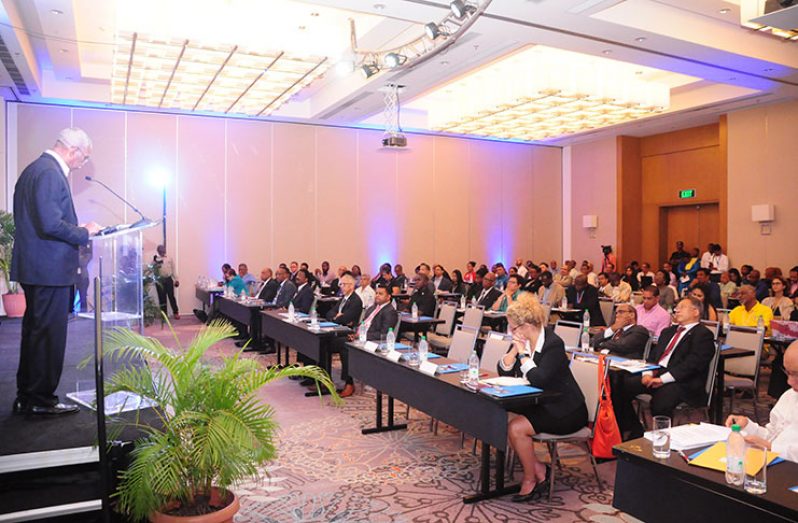…CDB representative urges Guyana Government
GRADUATING from a middle-income developing country to a high-income country will present the risk of Guyana moving from being able to access concessional financing to the access of commercial loans, so stakeholders were urged to improve competitiveness.As a low-income and then middle-income country, Guyana has enjoyed access to concessional loans which are extended on terms substantially more generous than market loans, but with the potential oil and gas industry this privilege might be limited.A representative from the Caribbean Development Bank (CDB), Kevin Hope, during a panel discussion on economic development at the just concluded Business Summit, urged the Government to look at ways to provide an injection for the private sector to lead growth through business in order to counter the inability to access concessional loans.
Local economist from the Inter-American Development Bank Mark Wenner, earlier in the discussion had explained that many donor countries raise money from their taxpayers to send as grants to the least-developed countries, so providing that Guyana moves to being a high-income earner, the argument will be more difficult.The CDB representative as such suggested that the government look at improving the country’s competitive ranking by employing initiatives that will inhibit economic growth. According to statistics that he read, Guyana was in the 100s for doing business and being competitive.Although government had announced many initiatives and projects that will be drivers of growth, Hope said the implementation rate has been recorded at south of 50 per cent over the past years.
“Around the Region we do a lot of talking and not implementing…there are over 147 items on the government’s agenda… We need to take our time and take a look at those that have a high impact and are easy to implement in order to develop a culture of implementation,” said Hope.In addition, he reiterated that in any sort of outlook when doing a vision plan, a Government needs to identify who would be the drivers of growth in an economy.The issue of bureaucracy in government was identified as one of the issues that might stymie the process. According to the CDB representative, Government needs to look at how they can design or provide support in order to attract the members of the private sector.

Over the years, the CDB has reportedly been focusing on helping government to design developmental plans and guidelines.Some of the necessary growth initiatives that the CDB has identified are to rebuild public trust and investor confidence, something which the Government of Jamaica has reportedly done to stabilise its economy.“To a large extent, the importance is designing a specific structure where all parties are involved,” asserted Hope, who pointed out that for instance in Guyana, women were earning less on average which adds to the risk of teenage pregnancy and domestic violence. He therefore indicated that empowering women could accelerate better outcomes.
Hope again made reference to Jamaica which had high debts, which were reduced when the country started focusing on delivery and implementation. Hope said the Government of Jamaica also had active engagements with civil society, the opposition and private sector, which led to continuity in growth. NATIONAL DEVELOPMENT PLAN Although Guyana’s economy is not the same as Jamaica’s, he said there needs to be a National Development Plan and the need for all stakeholders to align themselves to achieve the Sustainable Development Goals (SDGs). There is also need for strong visible leadership; clear mandates and a 90 per cent implementation rate.
The CDB representative said the Government also needed to strengthen the Public Sector Investment Programme (PSIP), given that in July Government had reported that less than 30 per cent of the PSIP was expended.Once all those issues are addressed, Hope pointed out that there would be better focus on private/public partnership.The concentration on primary production has however exposed the local economy to market volatilities and economic vulnerabilities, said President David Granger, who urged investors to diversify and innovate in order to avoid the distress caused by those variations.For years, major emphasis has been placed on the extractive industries, with little attention on creating a value-added product out of the raw materials that are extracted.
This was the main focus of President Granger during his remarks at the opening ceremony of the Private Sector Commission (PSC) and Inter-American Development Bank (IDB)’s two-day business summit held under the theme “Challenges and opportunities for growth and expansion,” at the Marriott hotel, Georgetown, on Wednesday.At the forum, stakeholders had an opportunity to relay their independent and uncensored views about how to improve business and by extension the economy.President David Granger pointed out what he termed as “the curse of the six sisters-” bauxite, gold, rice, sugar, fisheries and timber. He said the problem did not arise from the character of those commodities, but in the overdependence on raw products; lack of innovation; the absence of diversification and the neglect of value-added manufacturing.
Failure to innovate and diversify has reportedly made Guyana vulnerable to external shocks such as the decline in the price of the aforementioned commodities or loss of market access, which often leads to distress.Country Representative of the IDB, Sophie Makonnen, stated facts about the concentration on primary production, revealing that 90 per cent of Guyana’s export earnings are from primary commodities.“Americans, Brazilians, British, Chinese, Indians, Russians are all investing here, Why can’t you? Why should Guyanese have to be reminded to invest in their own country,” lamented the President, who said local investors had no reason for not increasing investments which would fuel the expansion of the economy and provide employment.With the intent on investment, innovation and an institutional framework for economic development, over the years the government has been working to create a more enabling environment for business development by encouraging investments and ensuring a stable macroeconomic environment.




.png)









